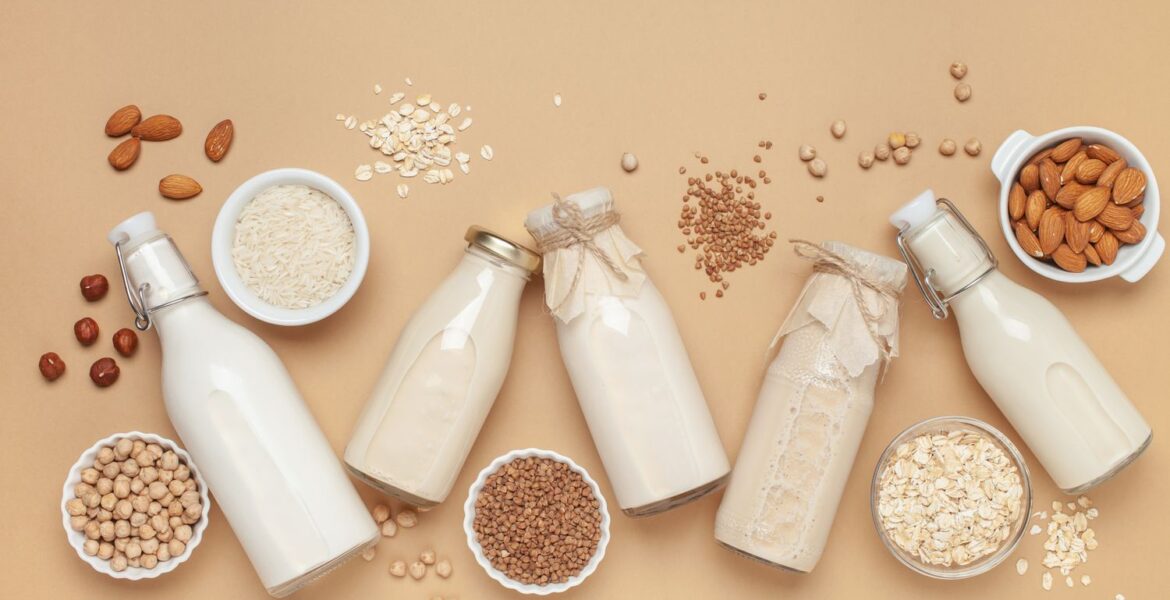Whether you’re lactose-intolerant, vegan, or just looking to switch things up, plant-based milk alternatives are a great choice. They come in a variety of flavors, textures, and nutritional profiles, making them perfect for different uses—from coffee to baking. But with so many options, which one should you choose? Here’s a guide to the best plant-based milk alternatives and how to use them!
Almond Milk

Almond milk is one of the most popular dairy alternatives. It has a mild, nutty flavor and a light texture, making it great for everyday use. It’s lower in calories than cow’s milk but may not be as protein-rich.
Best Uses:
- Great for lattes and coffee (opt for a barista-style version for better froth)
- Works well in smoothies and overnight oats
- Can be used in light baking recipes, like muffins and pancakes
Tip: Unsweetened almond milk is best for cooking and savory dishes!
Oat Milk

Oat milk is known for its rich, creamy texture and slightly sweet taste. It froths well, making it a favorite for coffee lovers. Plus, it’s high in fiber and great for gut health!
Best Uses:
- The best plant milk for cappuccinos and lattes
- Works wonderfully in creamy soups and sauces
- Perfect for baking cakes, cookies, and breads
Tip: Some oat milks contain added oils for extra creaminess—check the label if you prefer a cleaner option.
Soy Milk

Soy milk is one of the most nutritionally balanced plant-based milks, offering a good amount of protein, calcium, and essential amino acids. It has a slightly beany taste but works well in most dishes.
Best Uses:
- Ideal for coffee and tea (barista versions froth well)
- A great substitute for cow’s milk in creamy pasta dishes and curries
- A perfect base for protein shakes and smoothies
Tip: Opt for organic soy milk to avoid genetically modified (GMO) soybeans.
Coconut Milk

Coconut milk comes in two forms—canned (thicker, for cooking) and carton (thinner, for drinking). It has a mild coconut flavor and a rich texture, making it perfect for creamy dishes.
Best Uses:
- Essential for Thai and Indian curries
- A great base for tropical smoothies and pina coladas
- Works well in dairy-free ice creams and puddings
Tip: Use full-fat canned coconut milk for extra creaminess in soups and sauces.
Cashew Milk

Cashew milk is one of the creamiest plant-based milks, with a mild, slightly sweet taste. It blends well in both sweet and savory dishes.
Best Uses:
- Perfect for creamy pasta sauces, like Alfredo
- Great for making rich, dairy-free cheesecakes
- Works well in coffee and tea, with a natural sweetness
Tip: Homemade cashew milk is incredibly easy—just blend soaked cashews with water and strain!
Rice Milk

Rice milk is one of the most hypoallergenic options, making it great for those with nut or soy allergies. It’s naturally sweet but has a very thin consistency.
Best Uses:
- A good option for cereals and granola
- Works well in dairy-free rice puddings and light cakes
- Can be used in smoothies for a subtle sweetness
Tip: Because it’s lower in protein, pair it with other protein-rich foods like nuts or seeds.
Hemp Milk

Hemp milk has an earthy, nutty taste and is packed with omega-3 fatty acids, making it one of the healthiest plant milks. It’s also a great source of plant-based protein.
Best Uses:
- A great base for protein smoothies
- Works well in lattes, though it has a slightly grassy taste
- Perfect for making dairy-free dressings and sauces
Tip: Shake well before using—hemp milk tends to separate easily.
[Contributed By Anushka Gaikwad]











